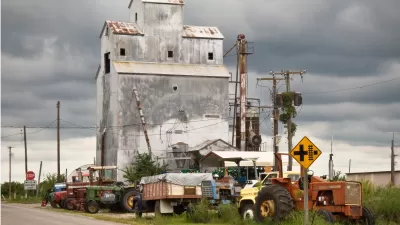Unlike conventional food hubs, Louisville's planned $50 million FoodPort will gather and 'incubate' regional food businesses. The hope is to breathe life into the area's struggling small farms.

Conceived by the nonprofit Seed Capital Kentucky, West Louisville's FoodPort promises a new and improved food hub. And food hubs can accomplish a great deal: "The one thing they all have in common is creating economies of scale for small and mid-sized farmers. Individually, these farmers wouldn't produce enough to reach large regional markets; together, linked by a food hub, they can."
West Louisville is beset by economic challenges, including unemployment and depressed earnings. As a light industrial development, the FoodPort may spur revitalization. "In some ways the FoodPort is more like a mixed-use development than a conventional food hub. Most hubs are single-entity businesses or organizations, while the FoodPort focuses on co-locating existing businesses that are, as [project director Caroline Heine] puts it, 'symbiotically related.'"
And away from the city, small farmers face a decline in demand for their traditional cash crop, tobacco. Rather than let those farms die, backers of the FoodPort want a local food renaissance. "Heine hopes that the FoodPort will do that for Kentucky—and help dispel the notion that local food is just for upper middle class yuppies. Seed Capital Kentucky believes it has identified significant unmet demand for local food in Louisville."
FULL STORY: Why Louisville Is Betting Big on a Massive Food Wonderland

Alabama: Trump Terminates Settlements for Black Communities Harmed By Raw Sewage
Trump deemed the landmark civil rights agreement “illegal DEI and environmental justice policy.”

Study: Maui’s Plan to Convert Vacation Rentals to Long-Term Housing Could Cause Nearly $1 Billion Economic Loss
The plan would reduce visitor accommodation by 25% resulting in 1,900 jobs lost.

Planetizen Federal Action Tracker
A weekly monitor of how Trump’s orders and actions are impacting planners and planning in America.

Wind Energy on the Rise Despite Federal Policy Reversal
The Trump administration is revoking federal support for renewable energy, but demand for new projects continues unabated.

Passengers Flock to Caltrain After Electrification
The new electric trains are running faster and more reliably, leading to strong ridership growth on the Bay Area rail system.

Texas Churches Rally Behind ‘Yes in God’s Back Yard’ Legislation
Religious leaders want the state to reduce zoning regulations to streamline leasing church-owned land to housing developers.
Urban Design for Planners 1: Software Tools
This six-course series explores essential urban design concepts using open source software and equips planners with the tools they need to participate fully in the urban design process.
Planning for Universal Design
Learn the tools for implementing Universal Design in planning regulations.
Caltrans
Smith Gee Studio
Institute for Housing and Urban Development Studies (IHS)
City of Grandview
Harvard GSD Executive Education
Toledo-Lucas County Plan Commissions
Salt Lake City
NYU Wagner Graduate School of Public Service


























